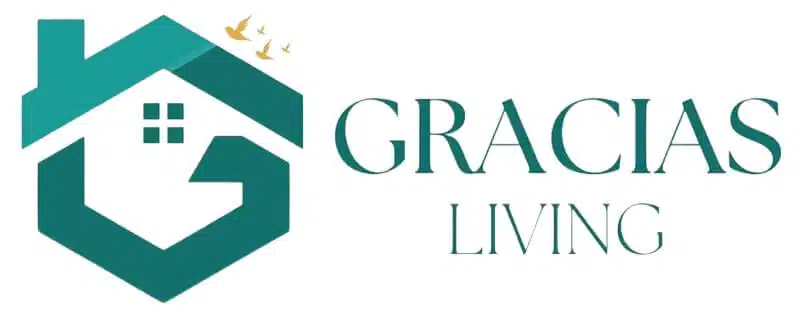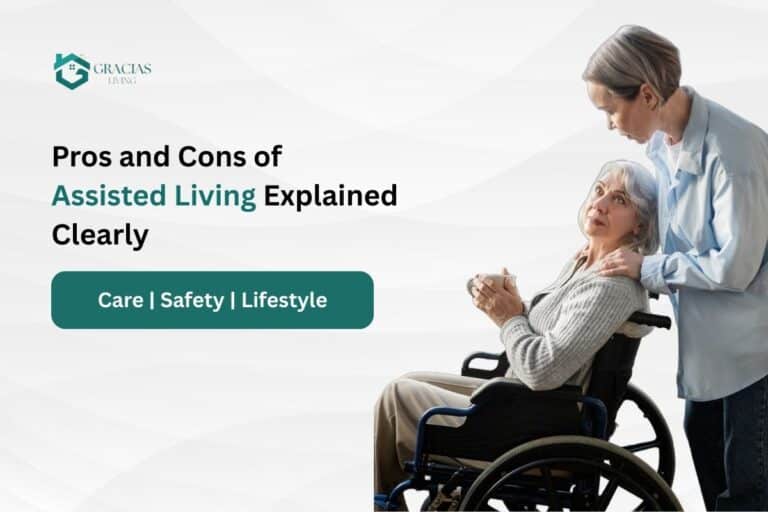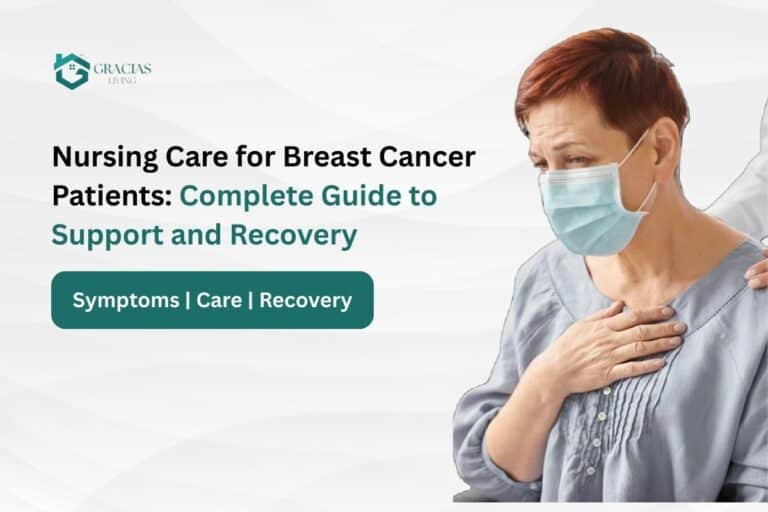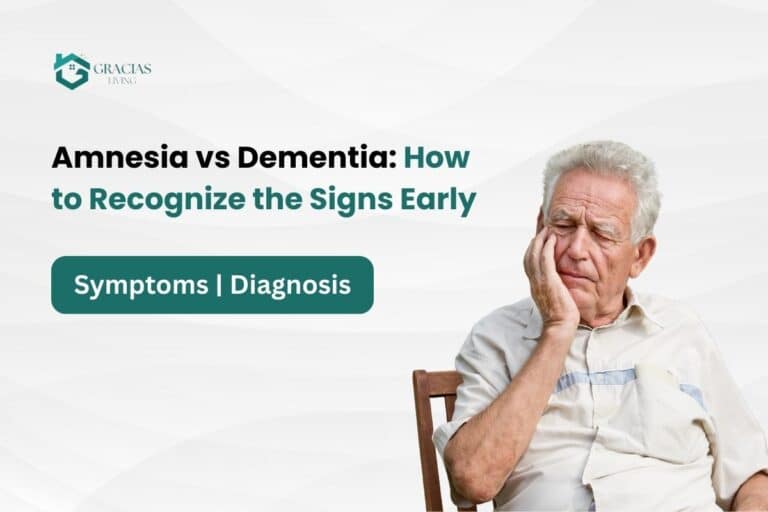Quick Summary of the article:
- ADLs, such as bathing, dressing, and eating, are crucial for self-care and overall health.
- The ability to perform ADLs is a key indicator of a person’s independence and well-being.
- Assisted living facilities provide support for individuals who need help with these essential tasks.
- Gracias Living balances independence with care, enhancing residents’ quality of life.
- ADL assessments are essential for determining the appropriate level of care and identifying areas needing support.
What are Activities of Daily Living?
Activities of Daily Living (ADLs) refer to the simple activities of self-care necessary for one to maintain independent living. They are fundamental activities for one’s own well-being and are typically learned in childhood. They are typically assessed by healthcare professionals to determine how one adapts and how much help they may require in order to live independently.
For individuals in senior and assisted living facilities, assistance with ADLs is often a crucial aspect of their care plan. Identifying and addressing difficulties with ADLs can significantly improve quality of life and ensure better overall health and well-being.
ADLs are generally categorized into two broad groups:
Basic Activities of Daily Living (Basic ADLs), which are essential to physical survival, and Instrumental Activities of Daily Living (Instrumental ADLs), or more complex activities that allow one to live independently within a community.
At Gracias Living, we understand the critical role that assistance with ADLs plays in the holistic care of our residents.
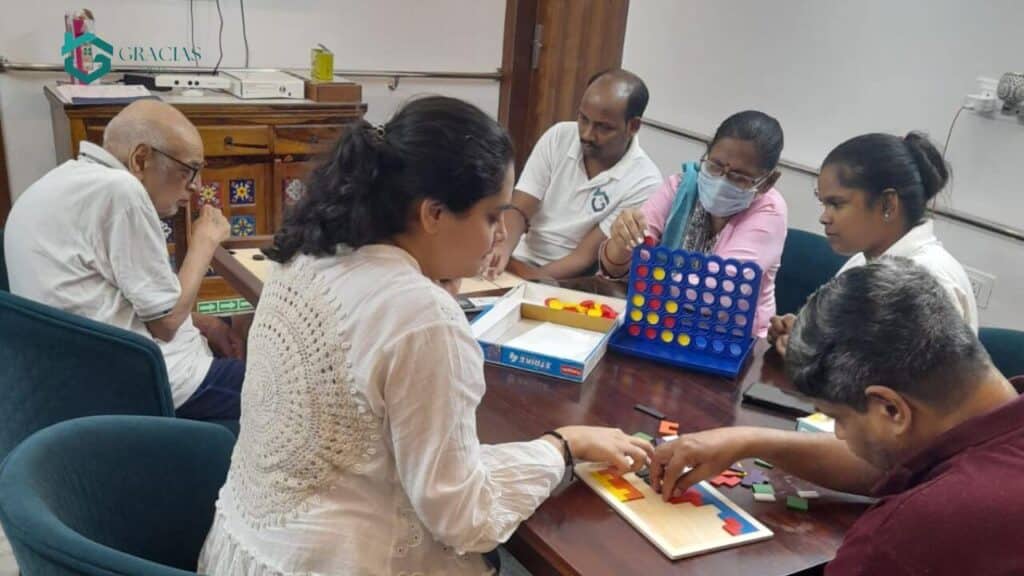
Importance of ADL
The ability to perform ADLs is a significant predictor of the status of a person’s health and is typically utilized to develop care plans, ascertain the eligibility for long-term care, or define the need for home assistance.
The impairment of the ability of an individual to perform ADLs can be a sign of an underlying medical condition, such as an injury, impairment, or chronic illness. By understanding a person’s capabilities, caregivers and healthcare workers know how to provide the right support for them to maintain their autonomy and dignity of life.
One of the most important measures of general health and functional condition is the capacity to execute ADLs.
Challenges pertaining to these tasks can substantially influence an individual’s freedom and quality of life, necessitating further assistance.
- Functional Assessment: In situations such as disease, disability, or age, healthcare providers use ADLs to evaluate a patient’s functional skills.
- Care Planning: Assessing ADL performance aids in figuring out the degree of care required, be it assisted living, home care, or care in a nursing facility.
- Rehabilitation Objectives: Improving ADLs is a typical objective in programs designed to help patients regain their independence.
Types of ADLs- Assistance with activities of daily Living
Basic ADLs and Instrumental Activities of Daily Living (IADLs) are the two categories into which the activities of daily living are divided.
The skills needed to handle one’s basic physical needs, such as eating, clothing, using the restroom, transferring or walking, and personal hygiene or grooming, are known as basic ADLs (BADLs) or physical ADLs.
More difficult tasks pertaining to being able to live independently in the community are included in the Instrumental Activities of Daily Living (IADLs). This would cover tasks like meal preparation, housework, laundry, medicine, and money management.
Basic ADL
Basic Activities of Daily Living (Basic ADLs) are the simplest self-care actions required for survival and physical health. They are the actions most healthy individuals can accomplish independently daily, such as feeding, dressing, and maintaining personal cleanliness. Whether an individual is able to do these actions is a major marker of their physical independence.
The 6 basic activities of ADL are cleaning, using the restroom, clothing, eating, moving around, and transferring.
1. Cleaning
This is the capacity to bathe or shower on one’s own, wash one’s face or body, and get in and out of the shower physically.
Even though this task is straightforward, elderly people may find it risky or extremely exhausting.
In general, seniors are more susceptible to cold and may age-related changes in their range of motion or balance.
2. Using the Restroom
The ability to use a toilet, get out of and into it, and clean up after oneself is known as toileting.
If necessary, this can also entail putting on protective underwear alone, such as diapers or surgical appliances.
You could also be required to change into adult diapers as you age because you might start to lose control over your bowel and urine movements.
Elderly people who are not accompanied when using the restroom may have minor or serious injuries since functional incapacity is linked to falls, and seniors are more likely to experience falls.
3. Clothing
This relates to the capacity to decide what to wear, how to put it on, and how to take care of one’s look.
Along the way, a variety of medical issues, such as arthritis, strokes, broken bones, or even cognitive impairments like dementia, can cause some older persons to lose the capacity to dress themselves.
In these cases, they may require assistance with dressing.
4. Eating
Older persons who are experiencing physical or cognitive deterioration may eventually lose their capacity to eat by themselves entirely.
A reduction in swallowing or motor abilities might bring this on. They may also encounter food and nutritional difficulties, such as appetite loss and simple meal forgetfulness.
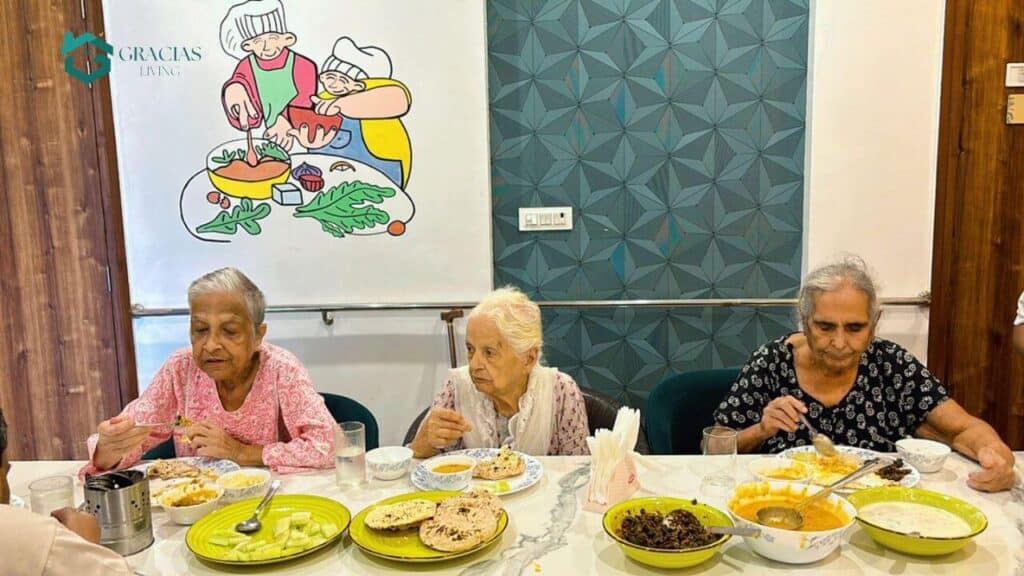
5. Moving around
The ability to sit, stand, walk, and move independently on level surfaces is referred to as functional mobility.
Using the restroom, rising from a couch or other piece of furniture, and climbing and descending stairs are additional mobility-related tasks.
As one age progresses the ability to move around declines, they may need support to walk or go to the restroom.
6. Transferring
Although the terms are sometimes used interchangeably, transferring refers to the entirety of the ability to move from a bed to an upright chair or wheelchair and back again.
Instrumental ADL
The knowledge and skills required to carry out specific everyday tasks related to an independent lifestyle are known as instrumental activities of daily living.
While not seen to be necessary for basic functioning, these tasks are thought to be significant for evaluating an individual’s relative independence and daily quality of life.
An assessment of an individual’s capacity to handle instrumental activities of daily living is frequently one of several criteria used to determine whether or not that person can securely live in their own home going forward without help from others.
For instrumental activities of daily living, there are usually seven areas of concentration, which include:
1. Telephone operation
This entails the capability to answer and initiate calls, query phone numbers, and use the telephone to convey in a significant way.
2. Folding and laundry
This includes being able to accomplish all the processes in doing laundry, including collecting clothes, utilizing a washer and dryer, and folding or hanging up.
3. Shopping and running errands
This entails the ability to make out a list of what to purchase, go to a store, and pay for items, and also the ability to run other errands that are required.
4. Meal preparation
This entails pre-planning a nutritious meal, accessing ingredients required, preparation, and serving a meal safely.
5. Medication management
This is the ability to take and manage medicines correctly, such as how to take the right dose and time, and refill prescriptions.
6. Housekeeping activities
This is daily cleaning and maintenance of the domestic environment, such as dusting, vacuuming, and keeping the living area tidy.
7. Capacity to manage and oversee finances
This is a skill to care for money affairs, like punctual payment of bills, banking account management, and budgeting.
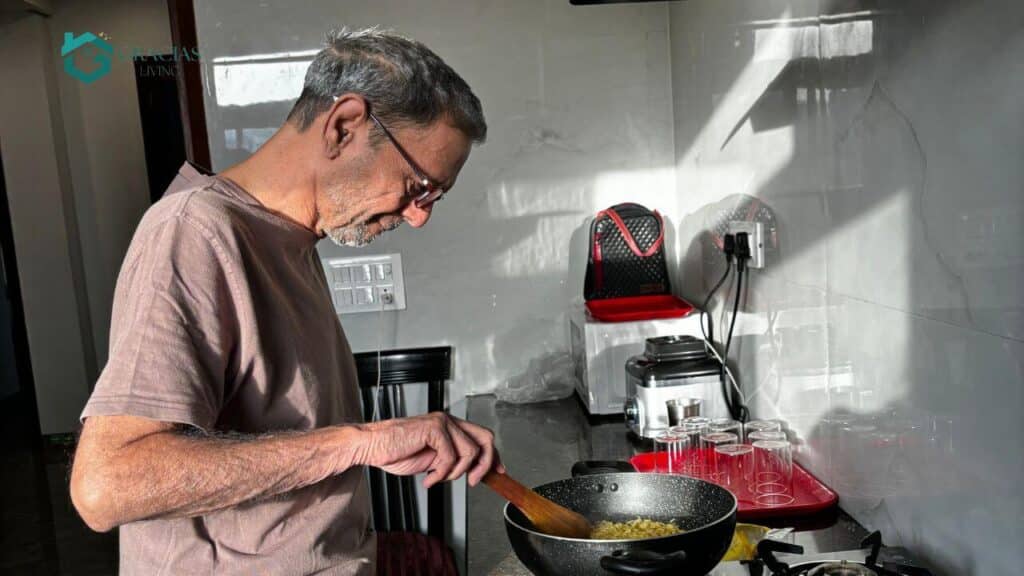
ADL Assessment and Evaluation
A person will need support based on their individual needs if they are unable to perform all of the ADLs or IADLs independently.
But how do we then assess whether someone requires assistance with these tasks?
ADL assessments are a useful technique for determining how well a person can think and move to social and personal care tasks.
An occupational therapist will usually carry out this procedure, which can be done at an assisted living facility or in the home of the elderly person.
Typical topics addressed in an ADL evaluation are as follows:
- Personal grooming and hygiene
- Physical Functions (eating, clothing, using the restroom)
- Mobility that is functional (access and transferring)
- Integration of the community
- Interaction with others and communication
- Establishing and maintaining a home
An ADL evaluation helps define and ensure appropriate care support, in addition to identifying an aged person’s physical and cognitive abilities and limitations.
Occupational therapists and senior care service providers can determine which areas your elderly loved one requires further support by evaluating the person’s ability to live independently.
Furthermore, these evaluations can establish whether an older adult requires additional therapy or support, either at home or in a long-term care institution.
It may also be employed as a tool to identify early indicators of disease or harm in patients.
Such hazards associated with being unable to go around could result in falls and injuries that could have been avoided.
Gracias Living: Helping elders in daily activities of living
Gracias Living offers a caring atmosphere to people who need help with everyday tasks.
We provide a healthy mix of care and independence, enabling people to keep their standard of living while getting the assistance they need.
With these key elements, we help the elderly in performing daily activities of living:
- Personalized Care Plans: Every resident has different needs. Personalized care plans are developed to address particular ADL difficulties and provide customized support.
- Medication Management: Taking care of medications can be difficult. Trained professionals at Gracias Living assist with medicine administration, lowering the possibility of mistakes and guaranteeing adherence to recommended schedules.
- Assistance with Personal Hygiene: To maintain their personal hygiene, General duty assistants help the elderly with dressing, grooming, bathing, and using the restroom.
- Nutritious Meals: Healthful meals are served to the residents keeping in mind their dietary constraints and personal preferences.
- Safety and Security: With amenities like secure doors, well-lit communal areas, and emergency call systems, Gracias Living puts residents’ safety first.
- Social connection: Having a community fosters social connection, which lowers feelings of loneliness and improves wellbeing in general.
- Flexibility: At Gracias Living we can modify the degree of care given to residents as their requirements vary, guaranteeing continuous support.
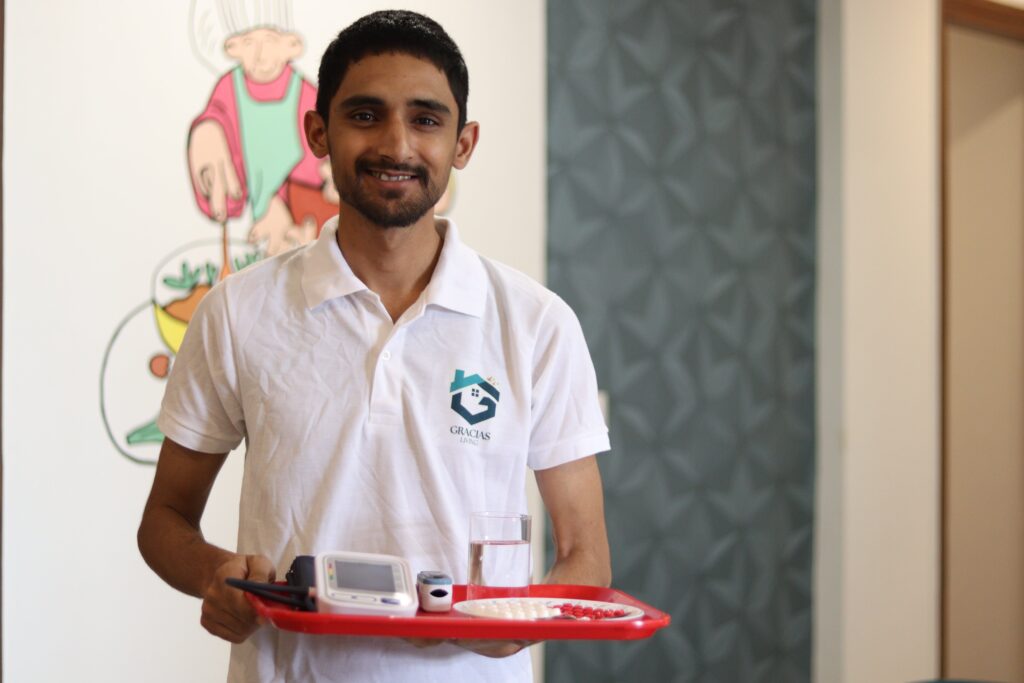
Conclusion:
Activities of Daily Living, or ADLs, are necessary self-care activities that include eating, clothing, and bathing.
One important metric for assessing general health and independence is the capacity to carry out ADLs. People may have trouble performing ADLs as they get older or have disabilities.
Assisted living facilities offer assistance to people in need of assistance with activities of daily living. They support residents in preserving their quality of life by providing a healthy mix of independence and care. Important services include:
- 24/7 staff support
- Personalized care plans
- Medication management
- Assistance with personal care
- Meal preparation
- Transportation
- Safety and Security
- Social interaction
ADL evaluations assist in determining the degree of care required and pinpointing areas in which people need assistance.
ADL evaluations and individualized care plans are provided by assisted living facilities like Gracias Living to fulfill the individual needs of their clients.
Essentially, ADLs are crucial for independent living, and assisted living facilities play a vital role in supporting individuals who face challenges with these activities.
Frequently Asked Questions
1. What are instrumental activities of daily living
Instrumental Activities of Daily Living (IADLs) are more complex tasks required for a person to live independently in the community. They require organizational and cognitive functioning and encompass activities like the management of money, use of public transportation, shopping, and meal preparation.
2. What does the activity of daily living (ADL) measure?
ADLs measure an individual’s functional ability, his or her ability to perform basic, everyday self-care functions. They are one way that health practitioners may assess an individual’s independence, safety, and potential need for assistance from others or assistive equipment.
3. What is the most common activity of daily living?
While the most common ADLs to require assistance may vary among populations and associated health conditions, bathing and mobility usually are among the first and most common functions for which older adults or persons physically limited require assistance.
4. How do ADLs differ from IADLs?
The primary difference lies in necessity and complexity. ADLs are the fundamental, underlying care activities required for physical survival, such as bathing, dressing, and eating. IADLs are more complicated activities required to live independently in a community but not required for basic functioning, such as shopping, managing money, and using the telephone. IADLs often decline before ADLs.
